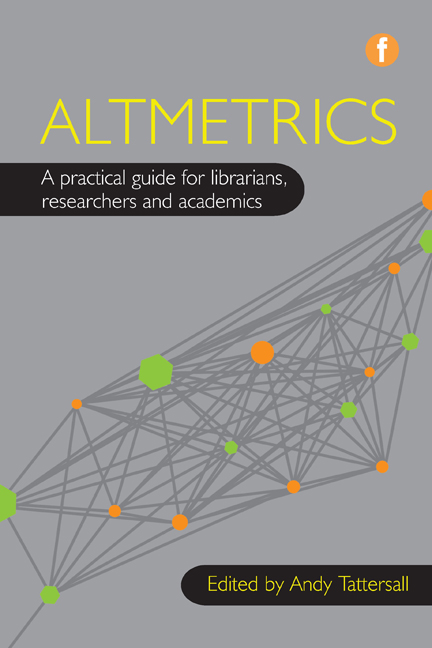Book contents
- Frontmatter
- Contents
- Contributors
- 1 Introduction
- 2 Road map: from Web 2.0 to altmetrics
- 3 ‘Metrics of the trade’: where have we come from?
- 4 The evolution of library metrics
- 5 The rise of altmetrics
- 6 Beyond bibliometrics: altmetrics reflects information about engagement with more types of scholarly content from more types of consumers
- 7 Considerations for implementing new technologies
- 8 Resources and tools
- 9 The connected academic: implementing altmetrics within your organization
- 10 Appmetrics: improving impact on the go
- 11 Open peer review
- 12 Conclusion
- Index
12 - Conclusion
Published online by Cambridge University Press: 08 June 2018
- Frontmatter
- Contents
- Contributors
- 1 Introduction
- 2 Road map: from Web 2.0 to altmetrics
- 3 ‘Metrics of the trade’: where have we come from?
- 4 The evolution of library metrics
- 5 The rise of altmetrics
- 6 Beyond bibliometrics: altmetrics reflects information about engagement with more types of scholarly content from more types of consumers
- 7 Considerations for implementing new technologies
- 8 Resources and tools
- 9 The connected academic: implementing altmetrics within your organization
- 10 Appmetrics: improving impact on the go
- 11 Open peer review
- 12 Conclusion
- Index
Summary
Introduction
This final chapter considers the evidence from the preceding chapters and attempts to summarize where the future lies for altmetrics and associated developments. As with the rest of the book, this chapter aims to give readers a realistic view of developments and of the benefits and pitfalls that LIS professionals face when contemplating new ways of incorporating technology into their work processes. The chapter aims to provide a picture of the here and now and looks to a future that holds many possibilities, but also uncertainties.
Altmetrics: a work in progress
Like so much published research that is supported by LIS professionals, the ideas and changes captured in this book are a work in progress. By the time this book is published altmetrics will be just over five years old. In relation to the creation of the web that is about one-fifth of its history. The web has existed for about one generation but has changed the lives of many demographic groups, academics being one of them. No one could have predicted what the web would look like five years ago and it is virtually impossible to say what it will look like in the future. However, what we can say about the current state of web and social technology adoption in relation to research publishing and communication is that it is in its greatest ever state of flux and change. The evidence presented in this book and other similar titles is that the academic community has been slow to adapt to the opportunities brought about by the internet. Universities and research centres were quick to make themselves visible on the web in the early 1990s, but beyond that there has been inertia, or certainly confusion over which areas to focus on. Other industries, including the arts, media and especially pornography, have seen the value in spreading their content across the web in easily accessible formats. But academic content is no less important or interesting to online communities. The biggest problem in terms of the slow uptake is two-fold. First is the confusion over which technologies and platforms to use, in addition to the creation of learning initiatives; second are the cultural issues surrounding change and the adoption of new ways of communicating and measuring research, which take many academics away from their comfort zone.
- Type
- Chapter
- Information
- AltmetricsA practical guide for librarians, researchers and academics, pp. 205 - 211Publisher: FacetPrint publication year: 2016



